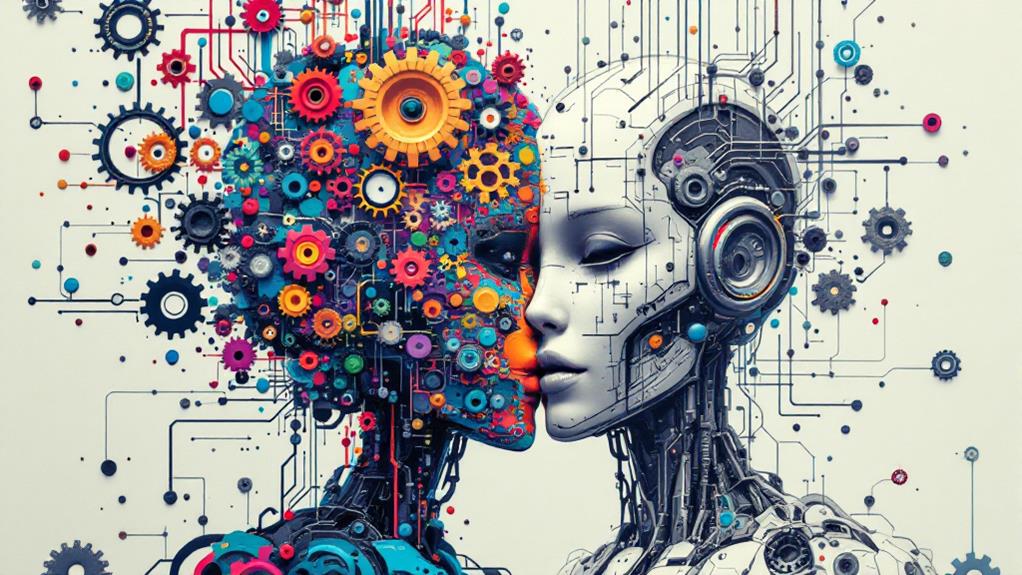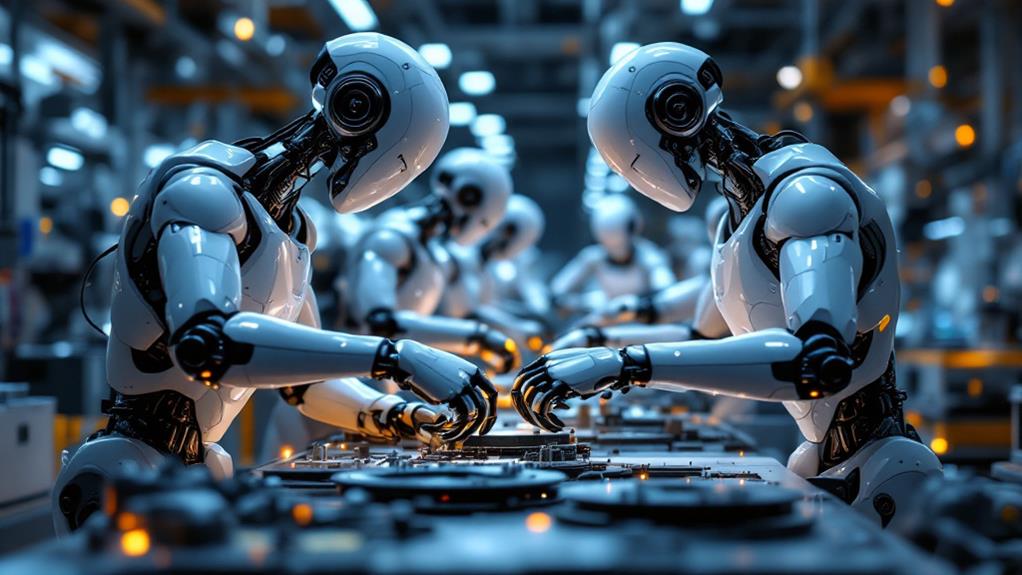Concerns Over the Growing Use of Robotics and Artificial Intelligence: What You Should Know

You should know that as robotics and artificial intelligence become more prevalent, they create critical concerns. Job displacement is a major issue, with millions of roles potentially evolving or disappearing. AI introduces ethical dilemmas about accountability and fairness, especially when biased algorithms skew outcomes. Privacy is at risk as AI systems handle more personal data, leading to potential misuse. Security threats from cybercriminals target these technologies, demanding strong protection measures. Furthermore, AI's rise affects human connections, challenging traditional interaction and empathy. If you're curious, there's much more to reflect on in this evolving landscape.
Job Displacement Worries
Amid the rapid advancements in robotics and artificial intelligence, many people are understandably anxious about job displacement. You've probably seen the headlines about automation trends reshaping industries, and it's natural to worry about how this might impact your career. As machines become more capable, tasks that once required human intervention are now being automated, and this can lead to significant shifts in the job market. However, it's crucial to focus on workforce adaptation to navigate these changes effectively.
The key to thriving in this evolving landscape is to adopt lifelong learning and skill development. You need to stay informed about which areas of your industry are most susceptible to automation. By doing so, you can identify new opportunities for career growth and guarantee you're not left behind. Consider exploring roles that require distinctively human skills, such as creativity, emotional intelligence, and complex problem-solving, which are less likely to be automated.
Furthermore, seek out training programs and workshops that can help you upskill or reskill. By proactively adapting, you can position yourself to take advantage of the new roles that will inevitably emerge as automation trends continue to unfold.
Ethical Challenges
Robotics and artificial intelligence present a host of ethical challenges that society must address. As these technologies become more autonomous, autonomy concerns arise. You may wonder who's responsible when machines make decisions independently. Guaranteeing accountability frameworks are in place is critical. These frameworks can help pinpoint responsibility and guarantee that creators, users, and regulators are all held accountable for AI's actions.
Decision making transparency is another significant issue. You should be able to understand how and why an AI system arrives at a particular decision. Without this transparency, it's difficult to trust the technology or evaluate its fairness and accuracy. Ethical programming becomes fundamental here. Developers must embed ethical considerations into AI, guaranteeing it operates in a manner aligned with societal values.
Social responsibility plays a significant role in how we deploy AI. You need to take into account the broader moral implications of AI use, such as its impact on privacy, security, and inequality. It's essential that AI systems are designed and used in ways that benefit society as a whole, not just a select few. Ultimately, tackling these ethical challenges requires active engagement and dialogue among developers, policymakers, and the public.
Bias in AI Systems

Addressing ethical challenges in AI naturally leads us to examine the widespread issue of bias in AI systems. You might wonder why AI, a seemingly neutral technology, could be biased. The answer often lies in the data. If the data used to train AI lacks diversity, the system can develop a skewed perspective, impacting its decisions. For example, if an AI system learns from a dataset mainly composed of one demographic, it might not perform well across different groups.
Algorithmic transparency is vital in tackling this problem. By understanding how an AI system makes decisions, you can identify potential biases. When algorithms are treated like black boxes, it's challenging to pinpoint the source of bias or correct it. Ensuring that AI developers prioritize transparency will help you and others trust the technology.
Moreover, promoting data diversity is another significant step. Encourage the use of varied and representative data sets during the training phase. This can help mitigate bias, making AI systems fairer and more inclusive. In your interactions with AI, staying informed about these aspects can empower you to advocate for and use AI responsibly.
Privacy and Surveillance
When you plunge into the domain of AI, privacy and surveillance issues often pop up as major concerns. As AI systems increasingly gather and process personal data, you might wonder who truly owns this information. Data ownership isn't always clear-cut, and it's vital to know how your data is used and who has access to it. Companies and governments often harness AI for diverse applications, from personalized advertising to monitoring public spaces. Without proper oversight, these practices can lead to invasive surveillance, infringing on your privacy rights.
To protect yourself, it's significant to understand consent frameworks. These frameworks are designed to guarantee you have control over your data, granting permission before it's collected or used. However, they aren't always straightforward or transparent. You should look for clear, easily accessible consent options that outline how your data will be handled. It's fundamental to stay informed and vigilant, as this empowers you to make informed decisions about your personal information.
In a time where AI and robotics are rapidly advancing, your awareness and understanding of privacy and surveillance issues are more crucial than ever. By prioritizing data ownership and consent, you can safeguard your privacy.
Security Risks

The rapid integration of AI and robotics into everyday systems brings significant security risks that you need to be aware of. As these technologies become more widespread, vulnerabilities increase, making them attractive targets for cybercriminals. One of the primary threats is malware attacks. Hackers can exploit weak security in AI systems, injecting malicious code that can alter how machines operate. This not only disrupts services but could also lead to catastrophic failures in essential sectors like healthcare and transportation.
Data breaches are another major concern. AI and robotics often handle vast amounts of sensitive data, from personal information to corporate secrets. If these systems aren't adequately secured, they become gateways for unauthorized access, leading to potential data theft. A single breach can compromise your privacy, expose confidential information, and result in severe financial loss for companies.
To protect yourself and your organization, prioritize implementing robust cybersecurity measures. Regularly update software, employ strong encryption methods, and stay informed about the latest security threats. By understanding these risks and taking proactive steps, you can better safeguard against the potential dangers posed by the growing use of AI and robotics.
Impact on Human Interaction
While security risks are a pressing concern, the impact of AI and robotics on human interaction is likewise significant. As you increasingly rely on digital communication, you might notice a shift in how people connect. Conversations that once required face-to-face interaction now often happen through screens, leading to a decline in personal exchanges. This change can affect your ability to read and respond to non-verbal cues, a key component of emotional intelligence.
AI-driven platforms can streamline communication, but they also risk oversimplifying complex human emotions. You may find it challenging to interpret tone and context when messaging lacks the nuance of a voice or facial expression. Relying heavily on digital communication could inadvertently weaken your emotional intelligence, making it harder to empathize with others.
Moreover, robots designed to mimic human interaction might further complicate matters. While they can serve as companions or assistants, they don't possess genuine emotional intelligence. As you engage with AI, you might unknowingly start to blur the lines between real and artificial relationships. It's vital to remain aware of these shifts and endeavor to maintain authentic human connections amidst the growing integration of AI and robotics in daily life.



